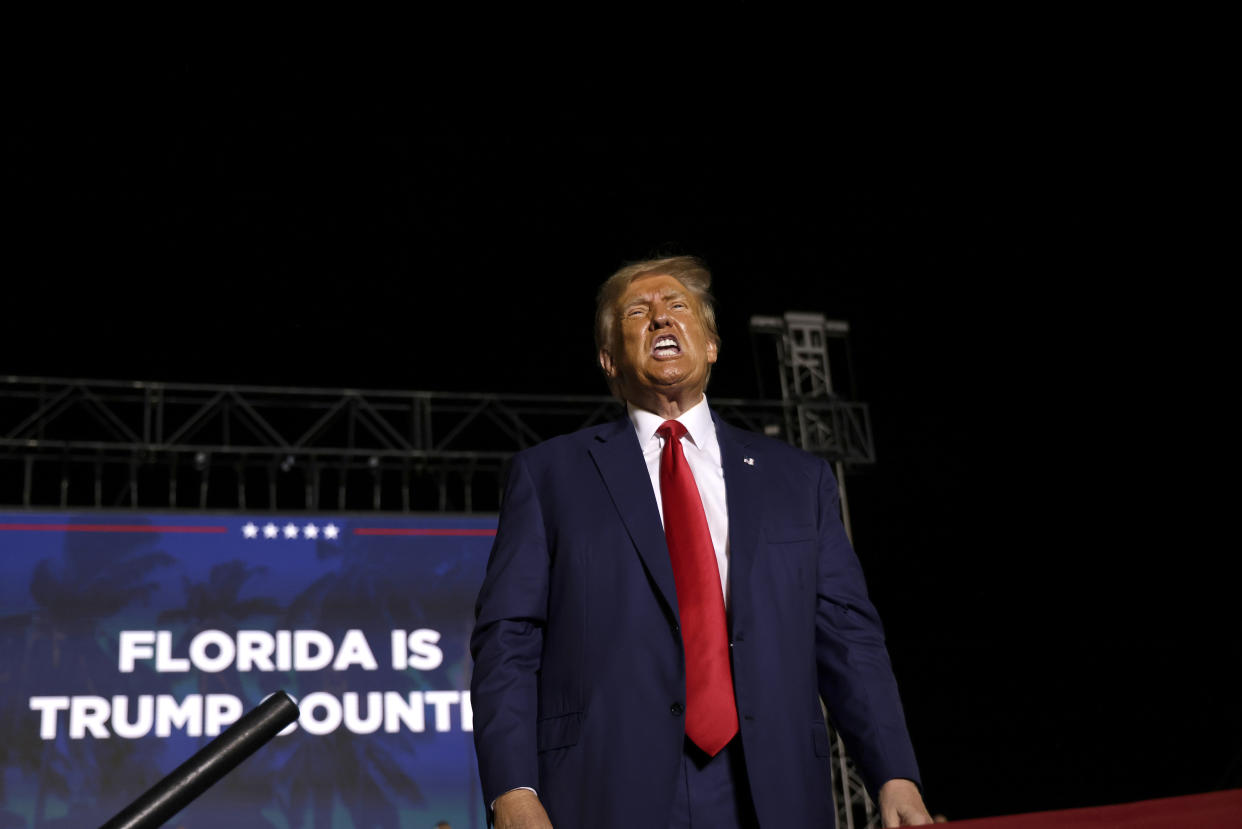Trump's Veterans Day speech gives new urgency to an old dilemma

- Oops!Something went wrong.Please try again later.
Former President Donald Trump has never kept his admiration for some of the world's most feared and reviled dictators a secret; his repeated adulation for North Korea's Kim Jong Un reportedly left world leaders in stunned silence; he's heaped effusive praise on Russian President Vladimir Putin; and according to his own former chief of staff, Marine Corps Gen. John Kelly (Ret.), Trump once commended Adolf Hitler for doing "a lot of good things." Throughout his administration and beyond, Trump has clearly cast himself as a fellow global strongman leader to those he's lionized — someone whose power is derived as much from sheer force of personality as it is from any legal framework.
With his 2024 re-election campaign underway — and decisively crushing the GOP field — Trump has leaned even harder into autocracy, with plans to "punish critics and opponents should he win a second term," and deploy the military against civil demonstrations," according to The Washington Post. And during his Veterans Day speech in New Hampshire this weekend, Trump offered a hint of what that might look like, vowing to the crowd that he would to "root out" his enemies that "live like vermin within the confines of our country" — in part to appease "capable, competent, smart, tough leader[s like] Russia, China, North Korea."
Trump's language, reiterated in a Truth Social post, prompted an immediate outcry from historians and academics alarmed that the terminology echoed that of historical dictators like Hitler, and Italian fascist Benito Mussolini. At the same time, it's reignited a long-simmering debate over how the media should cover a candidate who uses this sort of rhetoric.
'Pay some royalties to Mussolini's family trust'
Trump's language — and in particular the use of the term "vermin" — had been "used effectively by Hitler and Mussolini to dehumanize people and encourage their followers to engage in violence," New York University History Professor Ruth Ben-Ghiat told The Washington Post. MSNBC host Joe Scarborough agreed, telling historian Jon Meacham that Trump should "pay some royalties to Mussolini's family trust."
For Meacham, the threat from Trump's rhetoric was clear, in that it dehumanizes people to the point where you don't simply "open the door but to walk through the door toward the most ghastly kinds of crimes."
Trump's rhetoric was "straight-up Nazi talk, in a way he’s never done quite before," The New Republic's Michael Tomansky said, zeroing in on the term "vermin" as a unique invocation of past dictators, and calling it "Fascism 101." While in the past it's been "easy to think that when he hurls a historical insult, he just doesn’t know," Trump's remarks this weekend mean "we can now stop giving him the benefit of that particular doubt."
In a recent essay, Jay Nordlinger, Senior Editor of the conservative National Review admitted he'd "always assumed [Trump] was ignorant of the past — ignorant of the pedigrees of these words and phrases," in seeming agreement with Tomansky's point. "But," Nordlinger concluded, "to be honest, I’m not sure. Maybe he is. Maybe he isn't." For Trump's "defenders and 'splainers" who accept Trump's rhetoric in exchange for the belief that he genuinely has the nation's best interests at heart, "let's hope they're right. A lot rides on it."
'A tonal switch'
Citing pushback to The New York Times' initially "light-hearted headline" that "Trump Takes Veterans Day Speech in a Very Different Direction" — later switched to "In Veterans Day Speech, Trump Promises to 'Root Out' the Left" — Press Watch editor Dan Froomkin praised The Washington Post for using "Trump calls political enemies 'vermin,' echoing dictators Hitler, Mussolini" in its coverage — a straightforward headline likely made possible by "the outcry about the Times's profound cowardice."
The Post's headline represented "a tonal switch" to Froomkin, "from covering Trump as a plausible future president to covering him as a dangerous demagogue."
The solution, per New York University journalism professor Jay Rosen, is to not focus on "the odds," or horserace details of an election, "but the stakes" of what's to come. As if to prove that point, Trump spokesperson Steven Cheung released a statement to the Post vowing that anyone who makes the association between Trump and historical dictators will have their "entire existence [...] crushed when President Trump returns to the White House."

